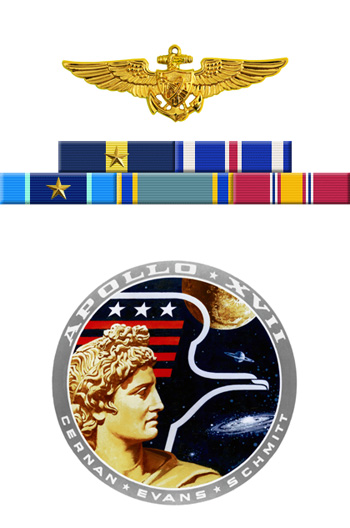
|
Eugene A. Cernan |
 |
|||
| Rank, Service | ||||
Captain O-6, U.S. Navy |
||||
| Veteran of: | ||||
|
||||
| Tribute: | ||||
Gene Cernan was born on March 14, 1934, in Chicago, Illinois. He was commissioned an Ensign through the Navy ROTC program at Purdue University on June 25, 1956, and then completed flight training, earning his designation as a Naval Aviator on November 22, 1957. LtJg Cernan then served as an F9F-8 Cougar pilot with VA-126 and an AD4 Skyhawk pilot with VA-113 at NAS Miramar, California, from July 1957 to 1961. He completed his master's degree in Aeronautical Engineering from the Naval Postgraduate School at Monterey, California in 1963. LCDR Cernan was selected as a NASA Astronaut in October 1963, and flew into space for the first time as pilot of Gemini IX from June 3-6, 1966. He served as backup pilot for Gemini 12, and backup lunar module pilot for Apollo 7 before serving as lunar module pilot on Apollo 10 from May 18-26, 1969. Capt Cernan next served as backup spacecraft commander for Apollo 14, followed by service as spacecraft commander of Apollo 17, the last scheduled manned mission to the moon, which lasted from December 6-19, 1972. During this mission, he became the last human to leave his footprints on the moon. Capt Cernan served as Special Assistant to the Program Manager of the Apollo Program from September 1973 until his retirement from the Navy and NASA on July 1, 1976. Gene Cernan died on January 16, 2017. |
||||
|
||||

